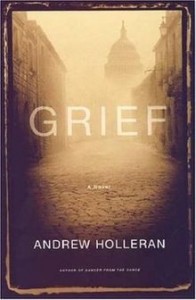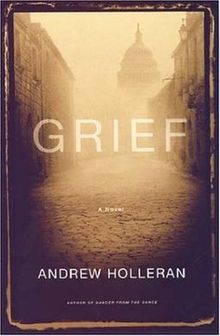 Grief
Grief
by Andrew Holleran
Hyperion. 150 pages, $19.95
THE UNNAMED NARRATOR of this remarkable novel arrives in Washington, D.C., on Martin Luther King Day to try to reboot his life after a long period of paralytic mourning for his mother, for friends lost to AIDS, and for his own lost youth, as well. He is somewhere in his fifties and single. His mother has been dead for more than five years, his father far longer than that. If he has had any history of romantic fulfillment, he does not cherish it. This man feels terribly alone.
A friend, Frank, has arranged for him to teach a seminar at a university in Washington. Frank has also persuaded someone he knows to rent the narrator a room for the duration of his semester-long stay. This character, referred to throughout as “my landlord,” is also in his fifties, trim, with a neat mustache. “Two creases formed parentheses around a thin mouth. It was the sort of face that had been used in the 70’s to advertise cigarettes.” A moment later it occurs to the narrator that he looks “a little like John Brown, the Abolitionist.” The landlord has a very nice townhouse near Dupont Circle. Its décor is eclectic but dated: “It was all like a house someone had designed in 1978—a more hedonistic era poured into the walls of this deep, narrow, sober old building.”
Something is a bit wrong with the landlord, the narrator senses almost immediately. When he suggests that they have dinner together the evening of their first meeting, the landlord says, “Oh no, I couldn’t,” adding, “I always buy a ton of chicken parts and boil them all at once, so I can live on them for a month and always have something to eat.” This ghastly regimen, noted again at various stages in the story, packs a peculiar and almost gothic punch, all the more so because nowhere else (apart from a jar of peanut butter, cubes of butter at a restaurant) is there specific mention of food. The narrator has meals, but we never learn what he eats. It’s as if, like a ghost, he doesn’t eat.
The first night of his stay the narrator finds on the bedside table of his third-floor room a copy of Mary Todd Lincoln: Her Life and Letters by Justin and Linda Levitt Turner. He starts reading it and is quickly hooked. An ominous sign, perhaps. This man has come to Washington to try to move on from grief and will now immerse himself in the letters of that city’s most tragic and extravagant griever, a lady who had already lost two sons before her husband was killed, who had lost numerous beloved Southern kinfolk to the Civil War but was obliged to pretend she didn’t care, who after the assassination lay prostrate in the White House for six weeks while the band played on, who lived the rest of her life dressed in costly widow’s weeds. If anyone in our nation’s past suffered not one but many hideous blows and then proceeded resolutely, defiantly, not to move on, it was Mary Todd Lincoln.
She and her era pervade this story in an increasingly fascinating way, partly because the narrator regards her with sympathy. Mrs. Lincoln to this day continues to be one of the most reviled figures in American history, a view that surfaces in Grief—Frank calls her a “banshee,” the landlord refers to her as a “conniving, paranoid shopaholic.” But the narrator’s many musings about her are never disparaging. He is awed and moved by her; he accords her the tenderest respect. This easily could have bordered on the maudlin, but doesn’t. Instead, Holleran pulls off the unlikely feat of making Mrs. Lincoln’s bleak final years a kind of magnifying glass, enlarging our understanding of the enormity that was the Civil War, and in the meantime providing historical context for the enormity of our own era, the catastrophe of AIDS.
The narrator sees Washington as a necropolis, dedicated at every turn to the dead, especially, he finds, to heroes of the Civil War. The streets are deserted after sundown, his favorite time to stroll “because at night I could not be seen.” Invisibility is important to this ghost. “What continued to soothe me was the emptiness of the city after dark. It was the perfect city for grief: like walking through a cemetery.” Maybe coming to Washington was not such a good idea, after all. His friend Frank thinks he should move there permanently, buy an apartment. So does the landlord. Both know that the narrator has been in a terminal rut. But what in Washington will change that rut? “You can’t sit shivah forever,” Frank tells him. “Yes, you can,” he replies.
On a walk at night the narrator inspects the White House, where TV cameras “shrouded in black tarpaulins” look “more than anything like a cluster of tombstones.” He returns to the house, “careful to make no noise” that would disturb the landlord, and pauses to study his reflection in a living-room mirror—“a tall, slender man in an overcoat, silver-haired, pale and indistinct.” What’s to become of these two, the reader wonders with a rising sense of dread.
They treat each other with exquisite courtesy, which the narrator realizes is a way to maintain distance. The routine includes leaving lights on after either one has gone to bed; they are so aloof from each other that often neither can be sure the other is at home. But when the narrator does know his landlord is home, “we were like spiders on the same web; I was aware of the slightest nuance of the stillness in the air between us.”
The landlord sequesters his dog Biscuit in his second-floor study whenever he leaves the house, because Biscuit would otherwise shred furniture. One day when the landlord is away at work the narrator opens the study’s doors to liberate the dog. But Biscuit is so accustomed to her cell that she doesn’t emerge. This reminds the narrator of Mary Lincoln, who ended her life shut up in hotel rooms and finally in her sister’s house, fearful of contact with the outside world. On subsequent days the narrator again opens the doors, each time lingering longer in the study, examining the contents, gleaning details of the landlord’s life, going through scrap albums and the like. This is snooping, but also an attempt to connect. The narrator wants to be more than an impersonal tenant. He is seeking intimacy in this lonely home.
Biscuit eventually does emerge, which leads to a household crisis. It is a testament to Holleran’s extraordinary skill that out of such mundane details he has assembled a story resonant with the tragedies of three American centuries. Grief captures the heartbreak of a generation-plus of gay men, men now well advanced in middle age, many of whom after the carnage of the plague can scarcely believe that they themselves are still alive.






